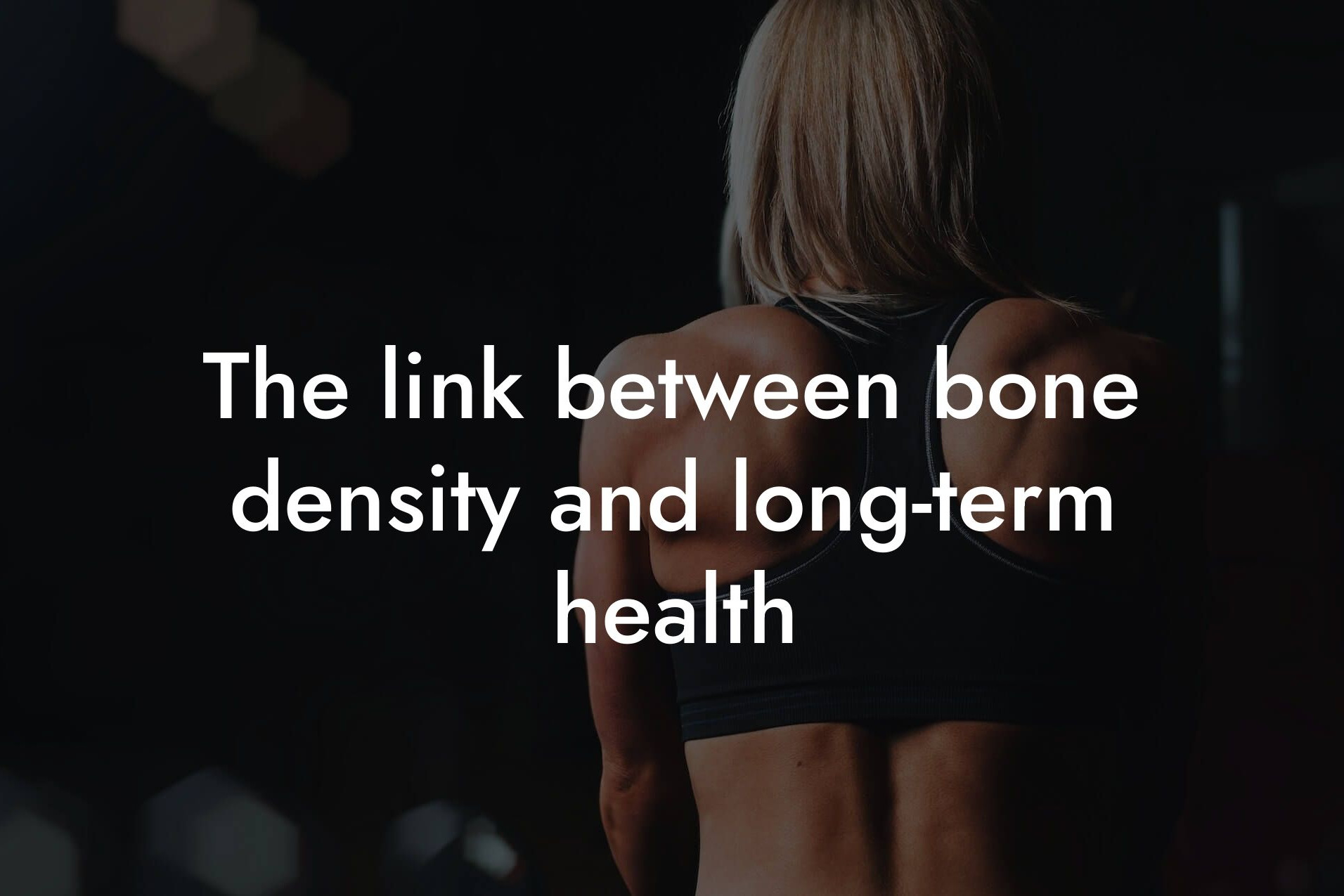As a high-earning professional, you're likely no stranger to the importance of maintaining a healthy and fit physique. Whether you're a busy entrepreneur, a high-powered executive, or a driven athlete, your body is your temple, and taking care of it is crucial for achieving success in both your personal and professional life. One often overlooked aspect of overall health is bone density, which plays a critical role in maintaining optimal physical performance and reducing the risk of injuries and chronic conditions. In this article, we'll delve into the importance of bone density for professionals and explore why it's essential to prioritize it as part of your overall health and wellness strategy.
Table of Contents
The Role of Bone Density in Physical Performance
Bone density refers to the measure of the amount of minerals, such as calcium and phosphorus, present in your bones. Having strong, dense bones is essential for supporting your muscles, tendons, and ligaments, allowing you to move with ease, strength, and agility. As a professional, you likely engage in regular physical activity, whether it's hitting the gym, playing sports, or simply keeping up with the demands of your busy lifestyle. Without sufficient bone density, you may be more prone to injuries, such as fractures, sprains, and strains, which can sideline you for weeks or even months.
Moreover, optimal bone density is critical for maintaining peak physical performance. When your bones are strong and dense, you can generate more power, speed, and endurance, giving you a competitive edge in your chosen activity. Whether you're a professional athlete or simply looking to stay active and healthy, prioritizing bone density is essential for achieving your goals and maintaining a high level of physical fitness.
The Risks of Low Bone Density
Low bone density, also known as osteoporosis, is a condition characterized by brittle, porous bones that are more susceptible to fracture. As a professional, you may be at increased risk of developing osteoporosis due to factors such as:
- Insufficient calcium and vitamin D intake
- Lack of regular exercise, particularly weight-bearing activities
- Hormonal imbalances, such as low testosterone levels
- Certain medications, such as corticosteroids and anticonvulsants
- Family history of osteoporosis
If left untreated, osteoporosis can lead to a range of serious health consequences, including:
- Fractures, particularly in the hips, spine, and wrists
- Chronic pain and disability
- Reduced mobility and independence
- Decreased quality of life
The Impact of Bone Density on Mental Health
Bone density is often viewed as a physical health concern, but it also has a significant impact on mental health. When you're struggling with low bone density, you may experience anxiety, depression, and reduced self-esteem due to:
- Fear of injury or fracture
- Reduced physical performance and capabilities
- Increased risk of chronic pain and disability
- Decreased confidence and independence
Conversely, maintaining optimal bone density can have a positive impact on mental health by:
- Boosting confidence and self-esteem
- Enhancing overall physical performance and capabilities
- Reducing the risk of chronic pain and disability
- Improving mood and reducing anxiety and depression
How to Improve Bone Density
Fortunately, bone density can be improved through a combination of lifestyle changes, nutrition, and exercise. Here are some tips to get you started:
- Engage in regular weight-bearing exercise, such as running, jumping, and weightlifting
- Incorporate high-impact activities, such as gymnastics and dancing
- Eat a balanced diet rich in calcium and vitamin D, including foods like dairy, leafy greens, and fatty fish
- Consider supplementing with calcium and vitamin D if necessary
- Get enough sleep and maintain a healthy body weight
- Reduce or avoid smoking and excessive alcohol consumption
DEXA Scanning: The Gold Standard for Bone Density Measurement
At Tano Performance Group, we understand the importance of accurate bone density measurement. That's why we use Dual-Energy X-ray Absorptiometry (DEXA) scanning, the gold standard for bone density measurement. DEXA scanning provides a comprehensive assessment of your bone density, allowing us to identify areas of concern and develop a personalized plan to improve your bone health.
Our DEXA scanning technology provides a range of benefits, including:
- High accuracy and precision
- Quick and painless procedure
- Low radiation exposure
- Comprehensive assessment of bone density and body composition
As a high-earning professional, you understand the importance of maintaining a healthy and fit physique. Bone density is a critical aspect of overall health, and neglecting it can have serious consequences for your physical performance, mental health, and overall well-being. By prioritizing bone density and taking proactive steps to improve it, you can:
- Enhance your physical performance and capabilities
- Reduce the risk of injuries and chronic conditions
- Improve your mental health and overall well-being
- Achieve your goals and maintain a high level of physical fitness
At Tano Performance Group, we're dedicated to helping professionals like you achieve optimal health and wellness. Contact us today to learn more about our DEXA scanning services and take the first step towards prioritizing your bone density and overall health.
Frequently Asked Questions
What is bone density and why is it important?
Bone density refers to the measure of how dense and strong your bones are. It's an important indicator of overall health, as strong bones are better equipped to support your body's weight and withstand everyday activities. Low bone density can lead to osteoporosis, a condition characterized by brittle and fragile bones that are prone to fractures.
Why should professionals care about bone density?
As a high-earning professional, you likely lead a busy and demanding lifestyle. However, neglecting your physical health can have serious consequences on your productivity, career, and overall well-being. Maintaining strong bones is crucial to preventing injuries, avoiding downtime, and ensuring you can continue to perform at your best.
What are the risks of low bone density?
Low bone density can lead to a range of serious health issues, including osteoporosis, fractures, and chronic pain. If left untreated, it can also increase your risk of developing conditions like osteoarthritis, spinal deformities, and even certain types of cancer.
How is bone density measured?
Bone density is typically measured using a dual-energy X-ray absorptiometry (DXA) scan. This non-invasive test uses low-level X-rays to measure the density of your bones, usually in the hip and spine. The results are then compared to a standard reference range to determine your bone density score.
What is a normal bone density score?
A normal bone density score is typically above -1.0 on the T-score scale. A score between -1.0 and -2.5 indicates low bone mass, while a score below -2.5 indicates osteoporosis.
What are the main causes of low bone density?
Low bone density can be caused by a range of factors, including genetics, hormonal imbalances, poor nutrition, lack of exercise, and certain medical conditions. Additionally, some medications, such as steroids and anticonvulsants, can also contribute to low bone density.
Can I improve my bone density?
Yes, there are several ways to improve your bone density. These include engaging in regular weight-bearing exercise, such as running or weightlifting, consuming a diet rich in calcium and vitamin D, and avoiding smoking and excessive alcohol consumption.
What role does nutrition play in bone density?
Nutrition plays a critical role in maintaining strong bones. A diet rich in calcium, vitamin D, and other essential nutrients can help support bone health. Foods that are high in these nutrients include dairy products, leafy greens, and fatty fish.
How does exercise impact bone density?
Regular exercise, particularly weight-bearing and resistance training, can help improve bone density. Exercise stimulates the growth of new bone tissue, making your bones stronger and more resilient.
Can I still improve my bone density if I'm over 40?
Yes, it's never too late to start improving your bone density. While bone density naturally declines with age, regular exercise and a healthy diet can help slow down this process and even improve bone density.
How often should I get my bone density checked?
The frequency of bone density checks depends on your individual risk factors and medical history. Generally, women over 65 and men over 70 should get their bone density checked every 2-3 years. If you have a family history of osteoporosis or other risk factors, you may need to get checked more frequently.
What are the best exercises for improving bone density?
The best exercises for improving bone density are weight-bearing and resistance training exercises, such as running, jumping, weightlifting, and bodyweight exercises like squats and lunges. These exercises stimulate the growth of new bone tissue, making your bones stronger and more resilient.
Can I improve my bone density through supplements?
While supplements can be helpful in supporting bone health, they should not replace a healthy diet and regular exercise. Calcium and vitamin D supplements can be beneficial, but it's essential to consult with a healthcare professional before adding any new supplements to your routine.
How does menopause affect bone density?
Menopause can lead to a rapid decline in bone density due to the decrease in estrogen levels. This increased risk of osteoporosis can be managed through hormone replacement therapy, regular exercise, and a healthy diet.
Can I still improve my bone density if I have osteoporosis?
Yes, it's possible to improve your bone density even if you have osteoporosis. While it may not be possible to completely reverse the condition, medications, exercise, and a healthy diet can help slow down bone loss and improve overall bone health.
What are the benefits of maintaining strong bones?
Maintaining strong bones can have a range of benefits, including improved overall health, reduced risk of fractures and osteoporosis, and enhanced athletic performance. Strong bones can also boost your confidence and independence, allowing you to live life to the fullest.
How can I incorporate bone-healthy habits into my busy lifestyle?
Incorporating bone-healthy habits into your busy lifestyle can be challenging, but it's not impossible. Try to prioritize exercise and healthy eating, and find ways to make these habits convenient and accessible. For example, you can try bodyweight exercises during your lunch break or prep healthy meals on the weekends.
What are the risks of not addressing low bone density?
Failing to address low bone density can have serious consequences, including increased risk of fractures, osteoporosis, and chronic pain. It can also impact your productivity, career, and overall quality of life.
How can I get support for improving my bone density?
Getting support for improving your bone density is crucial. Consult with a healthcare professional, consider working with a personal trainer or nutritionist, and join a community of like-minded individuals who share your health goals.
What are the benefits of working with a healthcare professional to improve bone density?
Working with a healthcare professional can provide personalized guidance and support, helping you to develop a tailored plan to improve your bone density. They can also monitor your progress, provide accountability, and offer expert advice on managing any underlying health conditions.
How can I track my progress and stay motivated?
Tracking your progress and staying motivated is crucial to improving your bone density. Set realistic goals, track your exercise and nutrition habits, and celebrate your successes along the way. Consider working with a accountability partner or joining a fitness community to stay motivated and engaged.
What are the long-term benefits of prioritizing bone density?
Prioritizing bone density can have long-term benefits that extend far beyond your physical health. It can improve your mental well-being, boost your confidence, and enhance your overall quality of life. By taking control of your bone health, you can live a healthier, happier, and more fulfilling life.
Here are some related articles you might love...
- The link between bone density and long-term health
- Bone density and aging: What professionals need to consider
- How to improve bone density naturally
- Understanding osteoporosis and its risks
- DEXA scan for bone density: What you need to know
- The role of calcium and vitamin D in bone health
- Best exercises for increasing bone density
- How stress affects bone density
- Nutrition tips for stronger bones
Zak Faulkner
Zak Faulkner is a leading authority in the realm of physical health and body composition analysis, with over 15 years of experience helping professionals optimise their fitness and well-being. As one the experts behind Tano Performance Group, Zak has dedicated his career to providing in-depth, science-backed insights that empower clients to elevate their physical performance and overall health.
With extensive knowledge of DEXA technology, Zak specializes in delivering comprehensive body assessments that offer precise data on body fat, muscle mass, bone density, and overall physique. His expertise enables individuals to make informed decisions and achieve their fitness goals with accuracy and confidence. Zak’s approach is rooted in a deep understanding of human physiology, combined with a passion for helping clients unlock their full potential through personalised strategies.
Over the years, Zak has earned a reputation for his commitment to excellence, precision, and client-focused service. His guidance is trusted by top professionals who demand the best when it comes to their health. Whether advising on fitness programs, nutritional strategies, or long-term wellness plans, Zak Faulkner’s insights are a valuable resource for anyone serious about taking their health and fitness to the next level.
At Tano Performance Group, Zak continues to lead our Content Team revolutionising how professionals approach their physical health, offering unparalleled expertise that drives real results.




